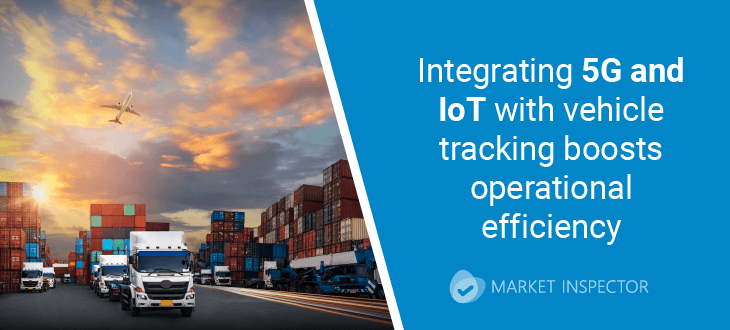Answer these simple questions and we will find you the BEST prices
Which type of solar quotes do you need?
It only takes 30 seconds
100% free with no obligation

Get up to 4 quotes from our selected suppliers by filling in only 1 form

Save money by comparing quotes and choosing the most competitive offer

Our service is 100% free and with no obligation
- Market-Inspector.co.uk
- Vehicle Tracking
- Vehicle Tracking Installation
- Tracking installation
The Best Options for Vehicle Tracking Installation Near You


- The vehicle tracking systems market is anticipated to experience significant expansion. Its value will increase to $43.23 billion (approximately £34.58 billion) by 2028, advancing at a compound annual growth rate (CAGR) of 16.9%.
- Tracking systems boost cost efficiency by monitoring driving patterns and vehicle usage, extending vehicle lifespan, reducing repair costs, and improving customer service with accurate arrival predictions.
- Vehicle trackers are crucial for theft prevention, particularly for businesses that use smaller, more vulnerable vehicles like electric bikes. They provide real-time location data and enable geofencing to alert owners when vehicles exit designated areas.
- Integrating modern technologies such as 5G and IoT with vehicle tracking systems enhances operational efficiency through faster data transmission and more precise tracking, supporting advanced fleet management solutions.
According to The Vehicle Tracking Systems Global Market Report 2024, carried out by The Business Research Company, a market intelligence provider. “The market size of vehicle tracking systems is expected to increase in the next few years. It will grow to $43.23 billion in 2028 at a CAGR of 16.9%.”
Understanding the various options for installing vehicle trackers is crucial when securing your business vehicles. Vehicle trackers deter theft and provide valuable data that can help manage fleet operations more efficiently.
This guide explores the different vehicle tracking installation options available, discussing their pros and cons and providing guidance on cost considerations.
- Describe your needs
- Get free quotes
- Choose the best offer
It only takes 30 seconds

Why should your business vehicles have a tracker?
Vehicle trackers offer significant advantages and are increasingly important in various business scenarios, including logistics, fleet management, and theft prevention for construction equipment, plant machinery and smaller vehicles like electric bikes.
Here’s an overview of the common scenarios and advantages of installing vehicle tracking systems in businesses, according to insights from The Vehicle Tracking Systems Global Market Report 2024, carried out by The Business Research Company, a market intelligence provider.
Theft prevention
Vehicle trackers are crucial theft prevention tools in sectors like local courier services, especially those using smaller, more vulnerable vehicles such as electric bikes. Additionally, trackers can monitor plant and machinery equipment.
They provide real-time location data and can alert business owners if a car moves out of a designated area, known as geofencing.
Fleet tracking
For businesses managing multiple vehicles, trackers help enhance operational logistics by providing valuable data on vehicle locations, routes, and statuses.
Systems like the MoreFleet from Trackershop can significantly improve route planning and reduce fuel consumption, which enhances overall efficiency and cost-effectiveness.
Regarding the market size of vehicle tracking systems, as The Business Research Company highlighted, the company’s report explains that: “The growth in the forecast period can be attributed to the increasing adoption of electric vehicles.”
It can also be attributed to “the growing demand for advanced telematics solutions, the increasing demand for safety and security in transportation services, the growing adoption of IoT and cloud-based solutions, and the increasing demand for real-time surveillance.”
Safety and monitoring
Tracking systems enhance safety by monitoring driving behaviours and vehicle speeds, reducing the likelihood of accidents.
According to The Business Research Company's report, they are particularly valuable in improving safety standards by providing features such as emergency buttons and automatic crash detection, which are vital following the rise in road accidents.
Real-time data and statistics
For logistics businesses with a fleet of vehicles, such as trucks and vans, vehicle trackers are essential for managing the fleet efficiently. They help monitor vehicle locations in real time, optimise routes, reduce fuel consumption, and ensure timely delivery.
The demand for fleet management solutions has been a significant driver of the vehicle tracking systems market growth, according to the report from The Business Research Company.
Cost efficiency and service enhancement
Vehicle tracking systems contribute to overall cost efficiency by monitoring driving patterns, vehicle usage, and maintenance needs, which can extend the lifespan of vehicles and reduce repair costs.
The Business Research Company report highlights that these systems also enhance customer service by providing precise arrival times based on real-time tracking.
Integration with advanced technologies
Integrating modern technologies like 5G and IoT with vehicle tracking systems further enhances efficiency.
This is echoed in the Business Research Company’s report, which notes that the growth of vehicle tracking systems can be attributed to “the growing adoption of IoT and cloud-based solutions.”
These technologies enable faster data transmission, better connectivity, and improved tracking accuracy, paving the way for more advanced fleet management solutions.
Overall, vehicle trackers help manage logistical operations more effectively and enhance vehicle safety and security, making them a wise investment for businesses relying heavily on transportation and deliveries.
How to approach vehicle tracker installation

Installing a vehicle tracker is critical for businesses aiming to secure and monitor their fleet. Still, the process can vary greatly depending on the type of tracker and the vehicle's specific needs.
Car tracker installation - or other vehicle types - operations can be broadly categorised based on complexity - from straightforward setups suitable for DIY installation to more sophisticated systems requiring professional installation.
Understanding these differences is crucial as some tracking solutions involve intricate connections with the vehicle’s onboard systems and cannot be reliably installed by amateurs.
We'll delve into each installation operation type in the sections below to better understand what each entails.
Plug-and-play trackers
Plug-and-play trackers are designed for ease and simplicity. This information is based on Teletrac Navman’s Telematics 2024 Report which emphasises that these devices typically plug into a vehicle's OBD-II port, usually under the dashboard.
The installation requires no tools or technical skills, making it an ideal choice for small businesses or fleet managers who need a quick setup. These trackers provide basic tracking functionalities like real-time location and historical route analysis.
It is important to remember that while these devices are easy to install, they might not offer advanced features such as detailed engine diagnostics or driver behaviour analytics that are available with more complex systems.
Hardwired trackers
Hardwired trackers are integrated directly into a vehicle’s electrical system, typically connecting to the ignition, battery, and ground wiring. This is based on insights from Bobit/ Fleet Group’s guide titled GPS Vehicle Tracking: A Start-Up Guide for Your Business.
This type of installation is more secure and tamper-resistant, making it suitable for long-term deployments. Hardwired trackers can track detailed diagnostics and are less easily removed or disabled than plug-and-play models, providing better security for valuable fleet assets.
Installation requires professional skills to avoid damage to the vehicle’s electrical system or tracker. It is suitable for fleets where robust data collection and integration with other telematics features are needed.
Battery-powered trackers
These trackers are ideal for non-powered assets such as trailers, containers, or construction equipment, as stated in Verizon Connect’s Fleet Technology Trends Report 2024.
They are equipped with power sources, usually long-life batteries, and can be mounted discreetly on any asset. Installation involves securing the tracker in a covert location to avoid tampering or theft, with considerations for environmental exposure and signal reception.
An additional consideration to remember is that regular maintenance is required to check battery life and ensure the device is operational, which can add to the total cost of ownership.
Local GPS installers and mechanics
According to insights from Bobit/ Fleet Group’s guide titled GPS Vehicle Tracking: A Start-Up Guide for Your Business, utilising local GPS installers and mechanics for vehicle tracker installation is an appealing option for businesses looking to support community enterprises while benefiting from region-specific expertise.
Local installers often have a good grasp of the vehicle models standard in their area, allowing for a more customised installation process. This solution strikes a balance, offering both benefits and drawbacks depending on the chosen provider's expertise.
Advantages
- Supports local economy: Choosing local services helps boost the local economy and can build beneficial business relationships within the community.
- Faster service: Due to their proximity, local installers often offer quicker turnaround times and may prioritise local businesses in scheduling.
- Cost-effective: Local mechanics typically have lower overhead costs than national chains, which can translate into lower installation prices.
- Personalised service: Local installers might provide more personalised service, adapting to specific business needs and offering flexible scheduling options.
Disadvantages
- Inconsistent quality: The primary disadvantage of using local installers is the variability in service quality. Experience and technical ability can differ widely, impacting the reliability and effectiveness of the installed trackers.
- Limited support for complex issues: Local mechanics may not always have the tools or expertise to handle advanced troubleshooting or complex system integrations, which could be crucial for sophisticated tracking systems.
- Potential for higher long-term costs: If the installation is not up to par, it may lead to frequent maintenance issues, increasing the total cost of ownership. Inadequate installations could also necessitate costly repairs or replacements down the line.
- Lack of specialisation: While local mechanics are versatile, they might not possess the specialised knowledge required for the latest or most complex GPS tracking systems, potentially affecting the tracker's functionality and integration with the vehicle’s systems.
While local GPS installers and mechanics can offer significant benefits, such as cost savings and personalised service, the potential variability in installation quality and expertise requires careful consideration.
Installation-included tracking solutions
According to Verizon Connect’s Fleet Management Software Buyer's Guide, businesses should often opt for installation-included solutions offered by specialised brands regarding vehicle tracking.
These providers typically guarantee that the tracking systems are integrated correctly with your vehicle’s electrical and data systems, ensuring optimal functionality. This is especially beneficial for complex systems that need detailed integration with the vehicle’s onboard diagnostics.
Advantages
- Guaranteed professional installation: These solutions ensure the system is installed professionally, which is crucial for complex integrations involving vehicle diagnostics and data systems. Proper installation by certified technicians minimises the risk of errors that could affect system functionality.
- Comprehensive support and warranty: Providers usually offer extensive support and a robust warranty, enhancing the system's reliability and performance over its lifetime. This can include troubleshooting, regular updates, and sometimes, on-site repairs or adjustments as needed.
- System compatibility and efficiency: Since the installation is handled by experts familiar with the product, there is a higher assurance that the tracking system will work seamlessly with existing vehicle systems, maximising efficiency and data accuracy.
Disadvantages
- Higher initial costs: The main drawback of installation-included solutions is the higher upfront cost. Since the price typically includes professional service and warranty, it can be significantly higher than purchasing a standalone device and arranging installation separately.
- Limited flexibility in choosing an installer: Committing to a provider's installation service means you’re restricted to their choice of technician and scheduling. This can be less flexible than hiring a local installer who can adapt more closely to your specific timing and location preferences.
- Dependency on provider: Relying on one provider for both the product and installation creates a dependency, which might limit your options if you want to switch providers or choose a different technology without a complete system overhaul.
Selecting installation-included tracking solutions is often the most reliable choice for businesses prioritising long-term functionality and support over initial cost savings.
DIY tracker fitting
While DIY installation of GPS trackers may seem like a cost-effective choice for businesses, it's often the least recommended approach due to the intricate installation process required for most professional vehicle tracking systems, according to Bobit/ Fleet Group’s guide on GPS Vehicle Tracking: A Start-Up Guide for Your Business.
Advantages
- Cost savings: The most apparent benefit is the potential cost savings; doing it yourself eliminates the need for professional installation fees.
- Immediate Setup: If you have the necessary skills, DIY installation can be done on your own schedule, allowing for an immediate setup without coordinating with external schedules.
- Simplicity for basic devices: DIY installation can be straightforward and quick for simple plug-and-play devices that don’t require complex wiring or integration with a vehicle’s electrical systems.
Disadvantages
- Technical challenges: Vehicle tracking often involves complex installations that can exceed the skill level of the average person, leading to errors and malfunctioning systems.
- Warranty issues: DIY installation might void the warranty provided by the tracker manufacturer, leaving you without coverage if the device stops working.
- Risk of malfunctions: An incorrectly installed tracker may lead to system failures. Not only does this mean the tracker won’t function as needed, but it could also lead to potential damage to the vehicle’s electrical system.
- Lack of support: Professional installations usually come with technical support. DIY installations mean you're on your own for troubleshooting and repairs, which could incur additional costs if something goes wrong.
- Time-consuming: While it might seem quick, DIY installations can be time-consuming, especially if unexpected issues arise.
Tracker fitting: how much does it cost?

Vehicle tracking systems are essential for businesses needing to monitor their fleet, but the cost of fitting these trackers can vary significantly depending on the chosen installation method.
Below, we explore the financial implications of three main installation options: local installers, installation-included solutions provided by specialised brands, and do-it-yourself (DIY) setups. Each option comes with distinct cost structures and levels of service reliability.
Local installation services
Relying on local mechanics or installers can lead to a wide range of costs, primarily due to the variability in service charges, expertise, and additional fees that might not be evident upfront.
This method can be unpredictable and costly if the installation is not done correctly the first time, leading to further adjustments or repairs.
It is also worth considering that not all local installers might have the necessary certification or experience with all types of trackers, particularly those that are insurance-approved or require specific technical skills for installation.
Installation-inclusive solutions
Opting for installation-inclusive solutions, such as those provided by established vehicle tracking companies like TrackerTeam, can be more expensive initially but offer more predictable costs. These solutions typically range between £189.00 and £599.00, including VAT, and are fully fitted by approved installers.
The advantage of this route is its peace of mind; the price you pay includes both the device and professional installation and often a warranty on both the product and the installation service.
This can be particularly reassuring as it ensures that the tracker is installed correctly, reducing the likelihood of future issues related to improper installation.
DIY installation
DIY installation is the most unpredictable in terms of cost but can be the cheapest option. The price for the tracker itself might be lower, and there are no installation fees. However, this approach requires good technical know-how and the correct tools to install the tracker without damaging the vehicle.
Additionally, incorrect installation might void the device's warranty and can lead to issues with insurance coverage if the tracker is required as part of your policy.
While DIY installations may appear cost-effective, they carry risks that might cost more in the long run. Installation-inclusive solutions balance cost and assurance, making them a preferable choice for business owners who require reliable vehicle tracking without unexpected expenses.
Local services provide a middle ground, though they require careful selection of a reputable installer to avoid hidden costs and ensure quality work.
Considering the need for professional and possibly Thatcham-approved installations for UK-based businesses, going with a recognised provider with transparent pricing and certified installers is often the safest and most hassle-free option.
Get multiple quotes
UK-based business owners should compare multiple quotes when installing vehicle trackers to ensure cost efficiency and service quality.
The market varies significantly in pricing and service levels, affecting upfront costs and long-term satisfaction. By comparing quotes, owners can find cost-effective solutions, enhance service quality, and tailor solutions to specific needs.
This approach secures competitive pricing and reliable service, which is crucial for effective tracking systems. It's advisable to request quotes from three to five reputable providers and carefully check for any hidden costs.
This strategy helps optimise investments in vehicle tracking technologies, ensuring they meet business requirements and maintain long-term reliability. Get tailored quotes now!
- Describe your needs
- Get free quotes
- Choose the best offer
It only takes 30 seconds

FAQ
For UK-based businesses, having a tracker fitted is often a wise investment. The benefits extend beyond theft prevention, including improved fleet management, better route planning, and potentially lower insurance costs.
The ability to monitor vehicle usage and improve operational efficiencies can significantly impact the bottom line. In regions with higher theft rates, like London, the added security can also provide peace of mind.
The cost of installing a vehicle tracker in the UK depends on the tracker type and installation method. Basic GPS trackers start at around £50, while advanced systems with features like real-time tracking can go up to £700 or more. Professional installation can add an extra £50 to £150.
Additionally, many trackers require a monthly subscription, ranging from £5 to £10 for essential services to £20 to £30 for comprehensive fleet management tools. Overall costs vary based on the tracker’s complexity and the services chosen.
Yes, you can fit your own car tracker; however, it is generally only recommended if you have the necessary technical skills. Incorrect installation can lead to malfunction or complete failure of the tracker, negating any potential benefits.
For businesses, professional installation ensures that the tracker functions correctly and optimally, which is crucial for relying on the data and security features provided.
Yes, it is legal to install a tracker on vehicles in the UK, provided you own the vehicle or have permission from the owner. For businesses, this means you can legally install trackers on company vehicles. However, it’s crucial to consider privacy issues; employees should be informed about the trackers, the data collected, and how it will be used, adhering to UK data protection laws.

Nicole Bea Kerr is a content writer for Market Inspector, leveraging her experience in B2B journalism and editing. She is interested in bringing more awareness to sustainability and helping businesses make informed choices through insightful narratives.
We strive to connect our customers with the right product and supplier. Would you like to be part of Market Inspector?

